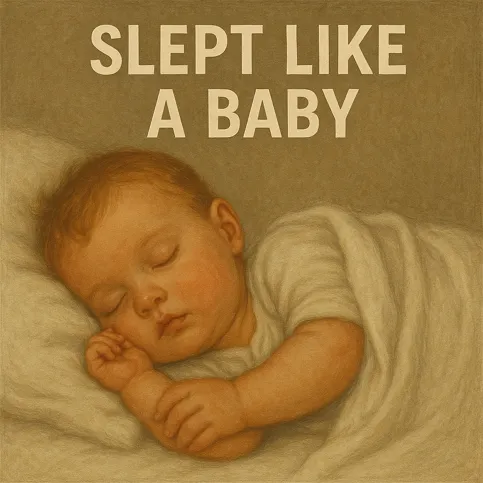What is the meaning of the phrase “slept like a baby”?
Slept deeply, peacefully, and completely undisturbed.
What is the origin of the phrase “slept like a baby”?
The precise origin and coinage of the term “slept like a baby”, or in present tense, “sleeping like a baby” is not known, although we do understand it to be a particularly old phrase in the English language, dating back many centuries.
The phrase is thought to be derived from observations around how babies tend to sleep remarkably well, even in the midst of a lot of noise. They tend to sleep so deeply that even loud noises such as doorbell rings or busy supermarket or restaurant noises can easily go completely unnoticed by them, and they may sleep right through it all. Additionally, young babies tend to need a great deal of sleep, and thus are known for sleeping and having naps in the daytime.
That said, however, anyone with a newborn baby will find considerable irony in the phrase “slept like a baby”, since to new parents it often feels as though a newborn baby wakes up every two hours soiled, crying and hungry. Moreover, it can be hard to get a baby to sleep, and this often requires effort on the parent’s part to settle them down. Maybe a more appropriate phrase might be “slept like a teenager on the weekend”.
Thus, the phrase “slept like a baby” is deemed by many to be a cultural interpretation of how peaceful and serene a baby’s sleep appears, as opposed to an accurate representation of their sleep patterns. The focus is on the quality of the sleep rather than the number of hours slept.
It is thought that babies have good quality sleep because when they do wake up, they tend to be wide awake and full of energy. Some speculate that the reason babies sleep so well is because they have few things to worry about and always get their needs met. They are considered trouble-free and completely unburdened.
How do you use the phrase “slept like a baby”?
The idiom and metaphor comparing someone’s sleep to that of a baby can be used in the present tense, i.e. “Sleeping like a baby”, or in the past tense “slept like a baby”.
Alternatively, someone might say something along the lines of “I’m going to sleep like a baby tonight” or “she will sleep like a baby now that she’s finally got away from him for good.” Using the phrase in this way is more about someone feeling worry-free rather than in literal terms of their sleep.
Despite the previously mentioned irony in the statement, the idiom is primarily understood to refer to good quality, undisturbed, uninterrupted and restful sleep, as opposed to its featuring short cycles of sleep.
How do you say the opposite of “slept like a baby”?
There are a wide variety of ways to express a bad night’s sleep. For example, you could simply say that you’ve had a terrible night’s sleep, or you could state how many hours you slept if it wasn’t very long. (Typically any sleep of 5 hours or less is considered a bad night’s sleep.) You could also say that you’ve had “fits” of sleep if you have slept for a while, then woke up, then fell asleep again and so on.
You could even say that you’ve “slept like a baby, awake every couple of hours”.
What are some other ways of saying “slept like a baby”?
In addition to the phrase “slept/sleeping like a baby” there are many other phrases that can be used to the same effect. A particularly well known one is “slept like a log”. Here are some more examples:
- slept soundly
- slept deeply
- slept peacefully
- slept like a log
- was out like a light
- conked out
- slept very well
- slept wonderfully
Saying “sleeping like a baby” in other countries and languages
Interestingly, phrases such as “sleeping like a baby” have similar idioms in other cultures, countries and languages. Here are some examples:
- Sleeping like a killed man (Russia)
- Sleeping like a suitcase in the station (Romania)
- Sleeping like a fur coat (Hungary)
- Sleeping like a rose (the Netherlands)
Notable uses of the phrase “slept like a baby”?
The phrases “slept like a baby” and “sleeping like a baby” are frequently used in: advertising, for literal use, self-help, as in improving your sleep hygiene, and in and comedy for ironic exaggeration. Here are some more examples.
Politics
After Bob Dole was defeated in the presidential campaign of 1996, he famously said, “I slept like a baby. I woke up every three hours and cried.”
More recently in 2005, the political commentator Maureen Dowd wrote in The New York Times: “The president says he slept like a baby the night of the invasion. That may be the problem.” This statement uses the idiom ironically, and also critically to suggest moral detachment or obliviousness.
Literature
In contemporary fiction banal phrases like “slept like a baby” to hide deeper turmoil. For example, in the emotionally charged novel My Sister’s Keeper by Jodi Picoult, published in 2004, a character talks about sleeping well even after devastating news, suggesting a defense mechanism or masking trauma.

